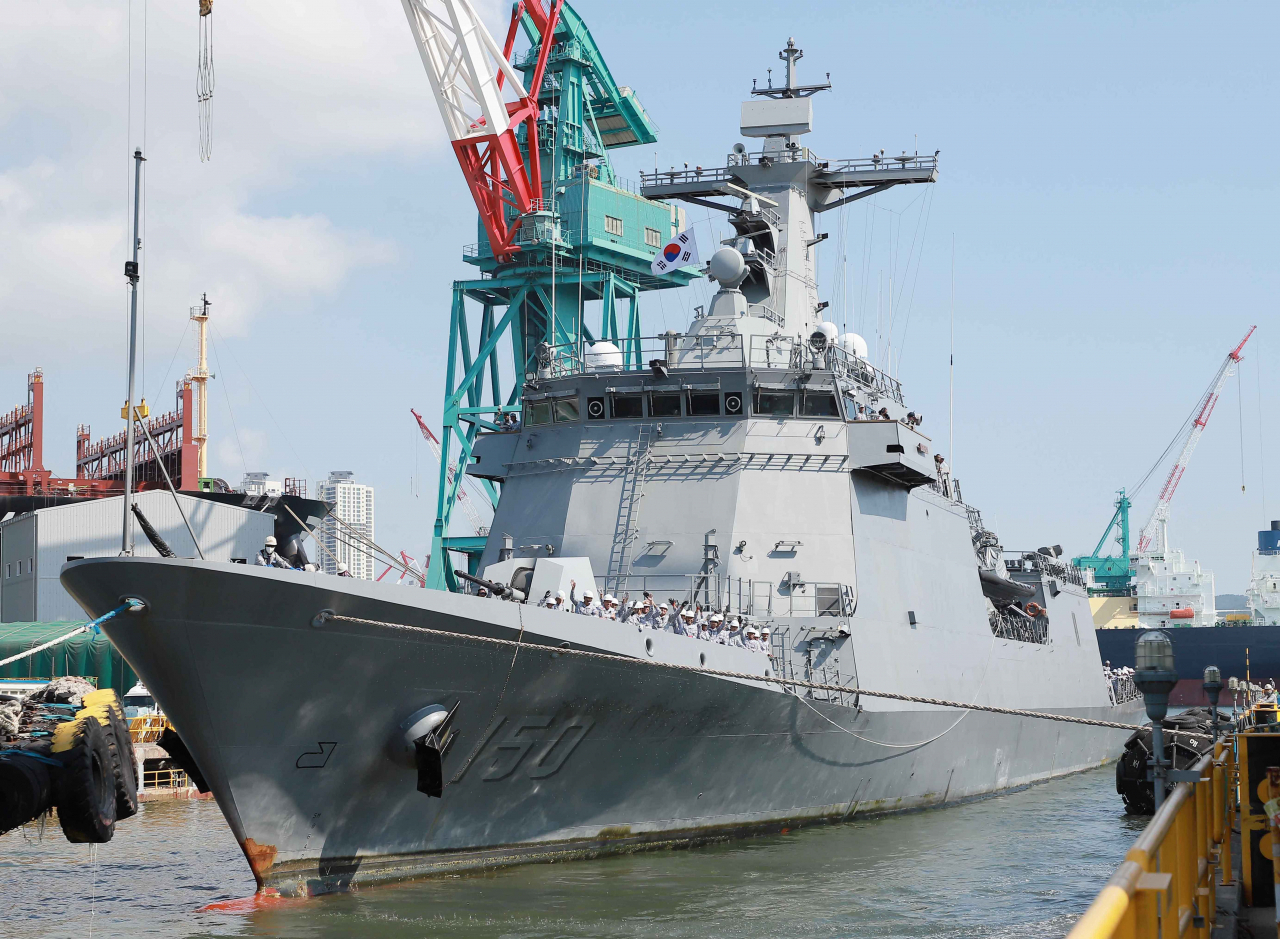[KH Explains] Korean shipbuilders eye US yards to tap Navy's lucrative repair deals
HD Hyundai, Hanwha seek to take advantage of protectionist laws -- Jones Act and Byrnes-Tollefson Amendments
By Moon Joon-hyunPublished : April 2, 2024 - 14:17

Korean automotive, battery and semiconductor titans have been navigating their investments toward American shores, driven by incentives from the Inflation Reduction Act and the CHIPS and Science Act of 2022. Now, the Jones Act and Byrnes-Tollefson Amendments might beckon Korean shipbuilders to American waters.
HD Hyundai Heavy Industries and Hanwha Ocean are setting their sights on acquiring American shipyards, specifically to tap into the maintenance, repair and overhaul (MRO) business. HD Hyundai's Vice Chairman Chung Ki-sun and Hanwha Group's Vice Chairman Kim Dong-kwan are visiting the US this month to explore opportunities in the US Navy's $21.5 billion ship MRO market.
MRO refers to the essential services required to keep naval vessels operational over their lifespans. Industry experts say that since naval vessels typically serve for several decades, securing contracts in the MRO space could provide a sustainable revenue stream and become a gold mine for Korea's shipbuilding industry.
Jones Act severely undermining US shipbuilding capabilities
The Jones Act mandates that domestic commercial ships be American-made. While the law does not directly apply to the construction of US military vessels, it has led to a limited number of shipyards capable of building large military vessels. Its protectionist nature has also reduced the pool of qualified US shipyards for the Navy's warship procurement process.
Currently, only three shipyards in the US are authorized to build American warships. These facilities are substantially smaller compared to their Korean counterparts, with Newport News Shipyard being a third of the size of HD Hyundai's Ulsan shipyard and less than half the size of Hanwha Ocean's Okpo shipyard.
Concerns about US shipbuilding capacity have been voiced by American officials, especially regarding potential military conflicts. According to data from the Office of Naval Intelligence, China's shipbuilding was 233 times that of US last year, capable of constructing 23.25 million gross tonnage annually compared to the US's 100,000.
The US also faces challenges in ship maintenance and repair. The Seawolf-class submarine USS Connecticut's collision repair in 2021 was hamstrung by a 20-month wait before repairs could even begin. This delay not only impacted the readiness of the USS Connecticut but also stalled the deployment of new Virginia-class submarines, as repairs monopolized critical construction docks.
Byrnes-Tollefson Amendments compel Korean shipbuilders to American shipyard stakes
In the eyes of Korean shipbuilders, however, the US Navy, with its formidable fleet of nearly 500 vessels including aircraft carriers, represents a compelling annual investment in MRO activities exceeding 20 trillion won ($14.8 billion). A critical shortage of domestic shipbuilding capabilities has prompted the US to look beyond its borders, with Korea poised to play a crucial role in filling this gap.
Yet, the logistical hurdles of transporting US Navy ships across the Pacific for maintenance in Korea's Geoje and Ulsan shipyards are considerable. Directly purchasing American shipyards to circumvent this issue is hindered by the Byrnes-Tollefson Amendments, which mandate that US ships funded by the Department of Defense use American-owned facilities for their maintenance and construction. While the US Secretary of the Navy has the discretion to approve MRO work overseas, this exception has been granted to countries like Japan so far, leaving Korean shipbuilders looking for alternative strategies.
To navigate these constraints, Korean shipbuilders are exploring the establishment of joint ventures, but granting management to a local entity is a complex issue that needs to be worked out.
HD Hyundai Heavy Industries is a pioneer in the field of overseas MRO, having provided services to the Philippine Navy. It has recently established a specialized ship engineering office in the Philippines to serve the Philippine Navy, staffing the Manila office with expert engineers and marketing professionals from Seoul, focusing on warship and specialty vessel design and MRO.
Joo Won-ho, head of HD HHI’s specialty ship business, mentioned during a press conference in Seoul last November, “Breaking into the US market is on our agenda, and we’re weighing options like buying a shipyard, investing in one, or maybe rolling out a local subsidiary. Given the critical role of MRO for warships, we’re putting a strong focus on that front as well.”
Hanwha Ocean, despite entering the MRO sector later, is trying to catch up with deep pockets and the formation of a dedicated MRO team.
It plans to invest 32 billion won in overseas shipyards and 10 billion in overseas MRO companies, utilizing part of the 1.49 trillion won raised from a capital increase last November. They have also initiated the setup of a US holding company and engaged in preliminary talks with Philly Shipyard.
“We’ve been scouting possibilities for US operations and Philly Shipyard is just one of the options on our radar. Securing a shipyard is no small feat, so we’re still figuring out our initial steps,” said a Hanwha official.
Protectionist laws are here to stay
It’s likely both companies will have no other choice but to invest in the US. An attempt to relax protectionist laws like the Jones Act with a 10-year waiver was also made during the Trump administration in 2019 but was thwarted by Republican opposition, and President Biden asserted strengthening the law in 2021.
"By reaffirming the Jones Act, we are investing in American workers and working to build a sustainable offshore energy sector, while limiting foreign competition as part of our new ‘Buy American’ program," Biden's team stated.



















![[Today’s K-pop] Treasure to publish magazine for debut anniversary](http://res.heraldm.com/phpwas/restmb_idxmake.php?idx=642&simg=/content/image/2024/07/26/20240726050551_0.jpg&u=)